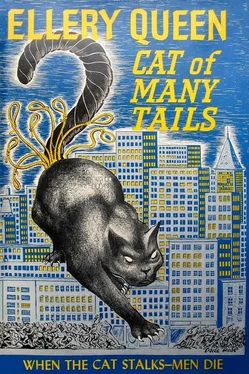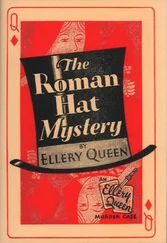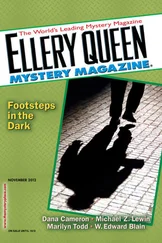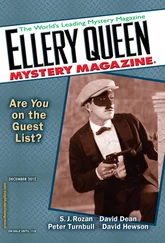“Celeste, if you’ll let me-”
“You’ve spoiled everything. Everything.”
The door slammed in his face. They heard the furious turn of the key, the lash of the latch chain.
“Each on one end,” mused Sergeant Velie. “Think that’s such a crosseyed idea? Did anybody take that into consideration? Two of them?”
Ellery muttered, “They’ve had a blowup.”
“Sure, last night. It was just terrible,” said Johnson’s voice cheerfully. “He says she suspected him of being the Cat and she says nonono it’s him who suspected her of being the Cat. Then they both deny it like mad. Going at it hot and heavy — I was out in the court there and I was afraid they’d collect a crowd and I’d have to fade. Well, sir, she starts bawling like she means it and what does he do but say a naughty word and damn near bust the hinges off the door blasting his way out.”
“Love’s sweet young stuff,” said the Sergeant. “Do you suppose it could have been an act? Maybe they’re wise to you, Johnson. Hey, Maestro. Where you going?”
Ellery sounded miserable. “Home.”
All during the week following Ellery had a sense of marking time. Nothing occurred of the least interest. He saw the reports on Jimmy McKell and Celeste Phillips; they had made up, they had quarreled again, they had made up again. Other reports had all but stopped coming in. One morning Ellery dropped in to view the lineup performance. As entertainment it was depressing, and it told nothing, but he experienced the satisfaction of a man who has performed a duty. He did not go again. He cleverly refrained from venturing below Centre Street and the good Magistrate at City Hall seemed to have forgotten his existence, for which Ellery was abysmally grateful. He saw little of his father and he purposely avoided asking questions about the progress of Dr. Cazalis’s investigation... And the Cat’s eighth tail remained a question mark on the front page of the Extra.
Even the newspapers were marking time.
It was curious. The status quo ante in American journalism is not a standing still; it is a going backward. A Page 1 story remains there only so long as it grows. Let it stop growing and it finds itself on Page 6, and it will continue this oblivious process until it backs right out of the paper. But the Cat story blandly bucked the rule. If it got nowhere, neither did it lose headway. It rode anchor on the front page. It was news even when it was not.
In a way, it was more news when it was not than when it was, when the Cat lay napping in his den than when he padded out to hunt another neck. His inactivity exerted a special attraction, horrid and hypnotic: the magnetism of suspense. It was like a smolder between bursts of flame. If, as Jefferson said, newspapers “serve to carry off noxious vapors and smoke,” the New York press could only obey the physics of the times.
It was during these intervals that the public nervousness was most remarkable. The waiting was worse than the event. When the Cat killed, people were actually relieved for a few days, in a semi-hysterical way; they and theirs were safe once more. But their dread was not destroyed; it was merely becalmed. Relief soon wore off, suspense surfaced again, the night anxieties, the counting of the days, the pitching wonder as to who would be next.
It was no use pitting the mathematical improbabilities against the individual’s fears. The psychological laws of lottery ruled, the only difference being that in this policy game the prize was not money but extinction. Tickets were free to all New Yorkers, and each holder knew in his heart he would win at the next drawing.
So the week wore on.
Ellery was thankful to see the week end; by Saturday it had become insupportable. His absurd Graph of Intervals persisted in haunting him. Between Victims 1 and 2, nineteen days; between Victims 2 and 3, twenty-six days; between Victims 3 and 4, twenty-two days; between Victims 4 and 5 — Monica McKell to Simone Phillips — the teasing, inexplicable drop to six days; and then the reascending curve of eleven days between Victims 6 and 7. Was this the beginning of a new upward spiral? Were the intervals leveling off? It was now the twelfth day after the strangling of Mrs. Cazalis’s niece.
In the uncertainty, each moment excreted fear.
Ellery spent that Saturday chasing police calls. It was the first time he had used any of the vague powers conferred on him by the Mayor’s appointment. He was not even sure it would work. But when he commandeered a car with a police radio, a black seven-passenger limousine with no identifying insignia occupied by a plainclothes chauffeur and his plainclothes companion showed up promptly. Most of the time Ellery slumped low in the tonneau listening to interminable accounts of “real baffling cases.” Each detective was the size of Sergeant Velie and each was equipped with inexhaustible lungs.
Ellery kept wondering on and off through the long tiresome day what had happened to his father. No one seemed to know where Inspector Queen was; he had left the apartment before Ellery rose, he had not been to Headquarters, he had not called in.
They roared with open siren from the Battery to the Harlem River, from Riverside Drive to First Avenue. They were in on the breakup of a teenage street fight in San Juan Hill and the arrest of a cocaine addict caught trying to slip a forged prescription by an alert Yorkville pharmacist. They visited the scenes of holdups, traffic accidents, minor assaults; on the agenda in order were a queue-pulling match off Chatham Square, an attempted rape in a Hell’s Kitchen hallway, the case of a getaway car in a Third Avenue pawnshop robbery. They witnessed the bloodless capture of a meek gangster in Little Italy wanted for questioning in an old homicide, the escape of a Lithuanian cook from a Little Hungary restaurant where he had suddenly gone berserk. There were four suicides — above the average for such a short period, the detectives explained, but it had been a bad summer, one in the Bowling Green subway station, an elderly Brooklynite who had thrown himself in the path of an incoming IRT express; another a Herald Square window-jumping case, a girl registered in a hotel from Chicopee Falls, Mass., identified as an eloper; another a gas range job in a Rivington Street tenement, a woman and a baby; the fourth an alcoholic case in the West 130s who had slashed his wrists. There were two homicide calls: the first, shortly before noon, a knifing in a Harlem poolroom; the second, at 6:30, a woman beaten to death with a Stillson wrench in the East 50s by her husband, an advertising agency executive. This last aroused some interest in the detectives since it involved another man, a Broadway character, and they were disposed to finger; but Ellery waved them on.
There were no strangulations, with or without cords.
“Just another day,” said the detective at the wheel as he slid the squad car into 87th Street. He sounded apologetic.
“Why not keep going tonight?” suggested the other detective as Ellery got out. “Saturday night’s always lively, Mr. Queen, and maybe it’s the Cat’s night out.”
“By the twitching of my left ventricle,” said Ellery, “I can tell it isn’t. Doesn’t matter, anyway — I can always read about it in the papers. Will you boys join me in a friendly glass?”
“Well, now,” said the driver.
But the other detective said, “Give your old woman a break for once, Frank. And I’ve got a long haul, Mr. Queen. Out to Rockville Center. Thanks just the same.”
Upstairs, Ellery found a note from his father.
It was a scribble marked 7 P.M.
EL — Been phoning since 5. Dashed home to leave this note. Meet me at Cazalis’s the minute you get in. Big powwow set for 7:30.
Читать дальше












